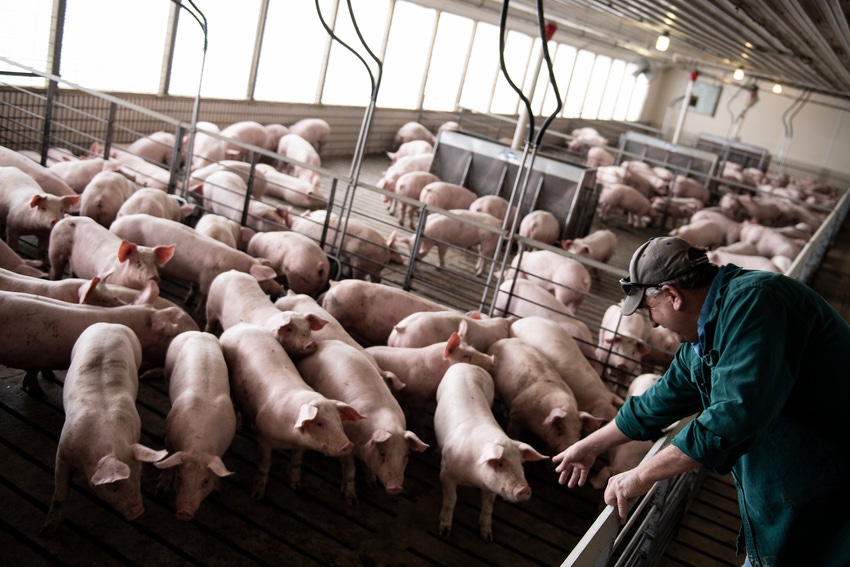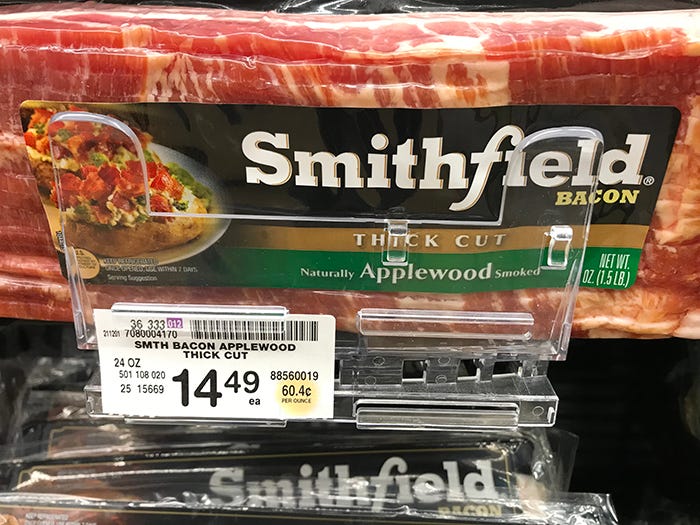
California’s Proposition 12 took effect on Jan. 1, 2022. As you know from reading this blog these past four years, the law says anyone who wants to sell pork to California’s consumers must abide by that state’s arbitrary, non-scientific livestock housing requirements, passed overwhelmingly by California voters some four years ago. As of Sunday all the pork sold in California must come from sows that have at least 24 square feet of usable floor space. The new law states, “Enclosures must be sufficiently large enough to allow sows to turn around without touching the sides of the enclosure.” California will send inspectors out to your farm to ensure your livestock buildings meet Prop 12’s space requirements.
The Supreme Court so far has not stepped in, despite clear signals that this is a violation of the U.S. Constitution’s Commerce Clause. Neither has Congress. And what about USDA? A letter was written to USDA Secretary Tom Vilsack on May 27, 2021, begging him to get involved in the Proposition 12 controversy. He has remained silent.
The letter included a report produced by North Carolina State economist Dr. Barry K. Goodwin, “California’s Proposition 12 and Its Impact On the Pork Industry.” The study finds that construction costs for a new 5,200-sow operation that meets the California requirements would be $15.6 million, while retrofitting an existing barn would cost an average of $10 per pig, or $770 million for the 77 million sows on U.S. pig farms.
Californians account for 13% of the nation’s pork consumption yet import 99.87% of pork consumed. California only produces approximately 99,000 hogs.
Daunting challenges
Jen Sorenson, President of the National Pork Producers Council, said “The challenges U.S. hog farmers face from Proposition 12 are daunting…” She also said “…if left unchecked, [Proposition 12] will result in a loss of 2.5 per cent of national pork harvest capacity, handing pork packers more market power at the expenses (sic) of hog farmers, especially smaller producers.”
The mainstream media is also taking notice. Over the weekend the Wall Street Journal opined that California is making bacon more expensive, writing, “a new law will force pork producers nationwide to comply with onerous regulations” (subscription required).
To date, all legal challenges to California’s Proposition 12 have been met with a stone wall of defeat from the courts. This coming Friday, the U.S. Supreme Court will consider whether or not to grant the writ of certiorari. All this means is that the US Supreme Court will take the case brought by the National Pork Producers Council and the American Farm Bureau Federation, or decline to take it.
California has filed its brief. Because California’s Proposition 2 was upheld regarding the size of cages for egg laying hens, there probably is not much hope that the US Supreme Court will take the Proposition 12 case.

Market disruption
Of course, there will be market disruption as existing facilities are either modified or completely replaced over the next 12 months. As Dr. Goodwin indicates, “We are months away from the intended implementation of Proposition 12 and many details regarding implementation remain uncertain.”
There’s nothing more daunting to a business leader than regulatory uncertainty. Pork producers of this country, and the industry as a whole, have been hesitant to change space requirements for hogs. While Dr. Goodwin believes cost upgrades could cost $10 per pig, “…Small operations will pay considerably more per animal. A farm of 1,000 animals will have costs that are about $15 higher per animal.”
According to Dr. Goodwin’s research most hog operations are “highly leveraged.” What this proposition means is there will be an increasing concentration of pork production as there has been increasing concentration in meat processing.
So, while politicians lament the loss of small independent farms, they do nothing when an onerous law like this is allowed to stand and put more production under the control of fewer, larger operations.
According to the 2017 Agricultural Census, “…there are 58,180 independent hog farmers. These independent farmers had 24.9 million hogs in inventory.” The contract growers are approximately 8,000 but have 47.5 million hogs. According to Dr. Goodwin, there are 5,862 farms owned by contractors, and they account for 29 million hogs.
As the industry braces for this change it’s easy to wonder: where is USDA and Tom Vilsack’s leadership on this issue? Mr. Secretary, America’s pork farmers need you.
Last week, I gave credit to a friend of mine, Eldon McAfee, for writing and educating the U.S. Supreme Court on California’s Proposition 12. Mr. McAfee is listed as counsel on the brief. He sent me an email and said the true writer of the brief was Matthew Berger, a non-member of the Bar of the U.S. Supreme Court.
Mr. Berger did an outstanding job representing pork producers and getting an exhibit before the Supreme Court about disease. (I recommend all of you read it.) It is attached to the Iowa-Minnesota plea to the U.S. Supreme Court to review California’s Proposition 12. You can find the letter attached to the brief to Dr. Elizabeth Cox from Sherrie Webb, Director, Animal Welfare American, Association of Swine Veterinarians.
Of course, there is not a veterinarian on the U.S. Supreme Court nor are any of the Harvard and Yale law clerks, and of course none of them have an animal background. I would urge all of them to read Director Webb’s letter because Mr. Berger did a brilliant job of having Director Webb explain on behalf of the 1,300 members of the swine veterinary industry on how California’s Proposition 12 will be a “disaster” not only for California consumers but for all of us.
As we all know, concentrated animal feeding operations "provide every animal with access to appropriate food and water; protect sows and piglets from detrimental effects associated with environmental extremes,…reduces exposures to hazards that result in disease, pain or injury to sows and piglets; allow sows and piglets to express appropriate behaviors and minimize expression of inappropriate behaviors with the constraints of the housing type; minimize aggression…promote good air quality and allow proper sanitation…”
According to Director Webb, as of 2017, there were 66,439 swine operations across the U.S. Director Webb believes the biosecurity problem created by Proposition 12 will lead to significant losses for everyone in the industry. For example, porcine reproductive and respiratory syndrome presently costs the America’s pork industry over $600 million annually. “Any introduction of a foreign animal disease into a pig herd would be economically devastating for all of agriculture.”
Director Webb tells the U.S. Supreme Court that foot and mouth disease and African swine fever “would result in $199.9 billion cumulative revenue losses across the commodities modeled over a 10-year period including $57 billion for pork, $17.2 billion for beef, … $44 billion for corn, $24.9 billion for soybeans, and $1.8 billion for wheat.” These numbers are not from me but are from Dr. Dermot Hayes, an economist at Iowa State.
Think about all those California inspectors visiting your CAFO. These diseases can be brought onto your property by unannounced visits from the California inspectors. These unannounced visits raise the disease control issue regarding biosecurity protocols. These unannounced visits by California inspectors under Proposition 12 are certainly unacceptable. A California certifying agent should not be granted unsupervised access for either announced or unannounced inspections.
Appendix A is loaded with more statistics that I cannot discuss or this blog will be too long, and is the reason I recommend to all of you read Mr. Berger and Mr. McAfee’s petition to the U.S. Supreme Court. We all pray to God the U.S. Supreme Court will reverse Proposition 12 from California because of the disaster it could bring to the U.S. swine industry and to the United States economy itself.
The opinions of the author are not necessarily those of Farm Futures or Farm Progress.
About the Author(s)
You May Also Like




